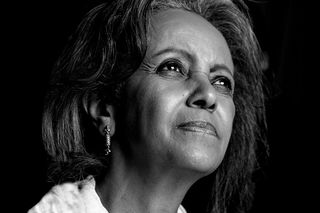
Ethiopia Appoints a Female President, and Fills Half Its Cabinet With Women
See world? It’s not that hard.

Last week, Ethiopia’s parliament appointed its first female President, Sahle-Work Zewde. Her appointment coincides with a major reshuffling of the country’s cabinet, so that now, half of the government’s ministers are women.
In her remarks to Parliament upon taking office, Zewde said: “If the current change in Ethiopia is headed equally by both men and women, it can sustain its momentum and realize a prosperous Ethiopia free of religious, ethnic and gender discrimination.”
Ethiopia is a deeply patriarchal society with a poor track record when it comes to policies that protect and empower women. While its female labor force participation rate (a sign of economic equity) is high, at 77% in 2017, the country struggles with violence against women; reports estimate that 46.9% of Ethiopian women experience “substantial levels” of physical, sexual, or psychological violence during their lifetimes. UNICEF reports that only 47% of Ethiopian young women are literate, compared to 63% of young men.
The role of president in Ethiopia is a largely ceremonial one — the prime minister is the primary functionary of the executive branch of government — but the appointment of a woman in that role is still a significant symbol. Furthermore, the most powerful cabinet post, that of the Ministry of Peace, which controls the intelligence and security forces, is now also headed by a woman, Muferiat Kamil. Ethiopia’s Prime Minister, Abiy Ahmed, who just took office in April, has repeatedly emphasized the need to overturn the country’s patriarchal mindsets. With these sweeping changes at the upper echelon of government, the country moves decisively in that direction.
Fitsum Arega, the Prime Minister’s Chief of Staff, tweeted: “In a patriarchal society such as ours, the appointment of a female head of state not only sets the standard for the future but also normalises women as decision-makers in public life.”
Sahle-Work has exemplary experience as a diplomat, having served as ambassador to several countries over the course of her career, and she has held leadership positions in the African Union and various UN bodies. She has a long track record of promoting gender equality and championing women’s causes.
“Government and opposition parties have to understand we are living in a common house and focus on things that unite us, not what divides us, to create a country and generation that will make all of us proud,” she said in her speech to Parliament on Thursday.
Sahle-Work is currently the only African female head of state. We can only hope Ethiopia’s example shows governments around the world that gender equality in leadership is a readily and easily achievable goal.
Related


A Brief List of All the Places I Take Menstrual Blood‑Soaked Pads
